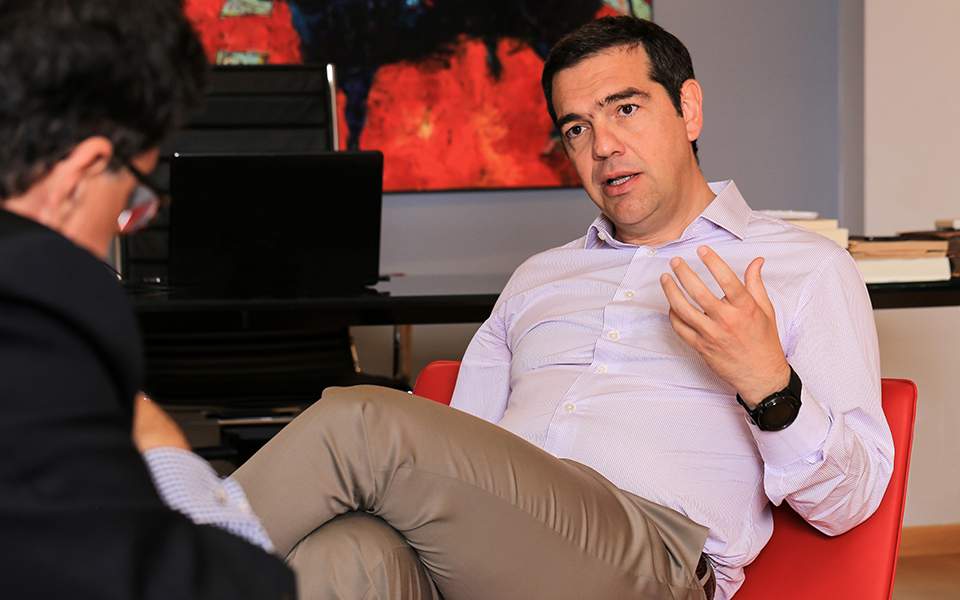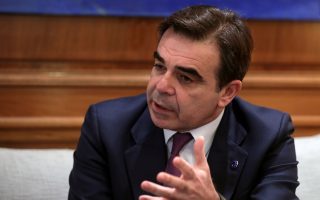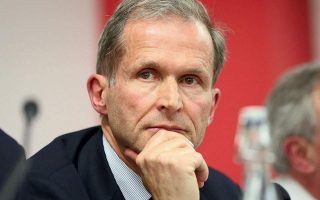Opposition chief slams government over economy

I met the leader of the main opposition at his office in SYRIZA’s Koumoundrou Square headquarters in downtown Athens. Alexis Tsipras gives the impression of a man going through a period of change, perhaps even introspection.
We discussed all the hot-button issues, without a previously arranged agenda or restrictions. He appears to be more or less on the same page with the conservative government on some of these issues and fiercely critical on others. It also is clear that some of the criticism he came under as prime minister from the current premier still rankles, particularly over the Prespes name deal.
Tsipras is forthcoming over the prospect of early elections, but also about the government’s handling of the coronavirus crisis and the role of its expert health adviser, Professor Sotiris Tsiodras. He also gives us his take on the mounting tension between Athens and Ankara.
To start with, I would like your assessment of Kyriakos Mitsotakis’ government now that it’s been a year since it was elected.
Allow me to split this 10-month period into the pre-coronavirus period and after. Up until the coronavirus crisis, the government had quickly dashed the expectations it had cultivated during the pre-election period for significant growth. In July 2019, we handed over an economy that was racing ahead with a 2.8% growth rate and by December 2019, growth had fallen to 1%. By the first quarter of 2020, we already had a recession of 0.9%, while the lockdown didn’t start until late March. We fell short of the target by 2 billion euros in the first two months of the year. The pandemic is therefore no excuse. Mr Mitsotakis brought the recession before the pandemic.
And we obviously did not see an explosion of investments. We’re still waiting for the bulldozers to start work at Elliniko, which should have begun in the first week [of the year]. The management of the migration crisis has also been terrible. The 6,000 migrants we left at Moria [on the eastern Aegean island of Lesvos] have now become 26,000, while efforts to build closed camps led to the ludicrous scenes of riot police chasing citizens and citizens chasing riot police on the islands.
Then the coronavirus struck. I won’t be a humbug; the government was relatively quick in falling in line with the international community’s recommendations. The citizens showed admirable discipline and, all together, we succeeded with as little loss of life as possible and without overburdening a very weak National Health System (ESY). The government obviously takes credit for the country’s success, though it is a success that belongs to the people. The opposition should also be given some credit for adopting a responsible stance.
I would like to ask you about the migrant standoff at the Evros border in early march. Would you have reacted in the same way, meaning would you have secured the border in the same way the current government did? Given that a section within SYRIZA pays very much attention to human rights, you would perhaps be divided on the issue.
What we were faced with was an attempt by migrants and refugees to cross the border en masse as Turkey exploited them to promote its own ends. In the face of such a development, any government would secure the border. There is no doubt that this was also SYRIZA’s clear position on the issue. Of course, we did criticize [the government] where necessary. We condemned the suspension of asylum applications, the unacceptable cases of vigilantism, the failure to decongest the islands and the transformation of Greece into a “dumping ground” for human souls through the government’s dogma of “Europe’s shield.”
Some critics argue that one of the key differences between your government and this one is that Prime Minister Mitsotakis uses more technocrats than you did. Is this true?
I’m not so sure that he uses technocrats more than we did. He just tends to hide ministers, who he does not trust perhaps, behind technocrats. He’s trying to do this now with [Finance Minister Christos] Staikouras, whom he obviously does not trust to manage the package of 32 billion euros, by running to [economist Christopher] Pissarides. He’s the prime minister; he can replace people he doesn’t trust.
Would you have done something different with regard to the health crisis?
We would have been quicker to bolster ESY with permanent hirings and infrastructure, both during the crisis and after it, making use of the time won by the citizens. The pandemic has brought to the fore the need to create a social safety net and to bolster the public sphere. The prevalence of a neoliberal philosophy over the previous years resulted in the false belief that if you have economic clout, you don’t need a public health system. What we have learned is that in the face of an emergency, everyone is vulnerable, regardless of economic clout. People with enormous economic power and poor citizens both turned to the public health system for help. This changes society’s perception of the public sphere and the public health system, and this is the core philosophy of the progressive forces and the Left – in contrast to the neoliberal Right, which even wants human life to be regulated by the rules of the market. On these issues, Mr Mitsotakis has had to drag himself to our way of thinking.
What do you think of Europe’s response to the health crisis and its heralded package of measures? And what does this mean for Greece?
Europe’s response is often too little, too late. Nevertheless, I have to admit that following the Commission’s proposal the response has been much improved, despite being overdue. The proposal includes a string of demands made by progressive forces as well as the South, such as an element of reciprocity, the notion of solidarity – each according to his means and needs – and the element of strengthening the EU budget, a consistent progressive and federalist demand. There are, therefore, significant qualitative differences.
Can the 32 billion euros Greece is entitled to from the EU recovery fund be regarded as a success?
I believe so, yes. But let’s not talk of 32 billion, because 9 billion euros is in the form of a loan and I am skeptical of loans, especially when our debt is at 180% and leaning toward 200% percent of gross domestic product. Nevertheless, the boost of 22 billion euros is important and positive. Brussels and Berlin appear to acknowledge that the systemic risk called Italy is very important to the stability of Europe.
As prime minister, you developed a close relationship with German Chancellor Angela Merkel and others as well. Are you still in touch?
I am, with [French President Emmanuel] Macron and with Merkel, but also with [Spanish Prime Minister Pedro] Sanchez, [Portuguese PM] Antonio Costa, [North Macedonia’s former premier] Zoran Zaev and [Albanian PM Edi] Rama. I’ll speak with Macron when France is facing a tough situation, I’ll send a message of support. I have also exchanged messages with Angela Merkel with the pandemic. I have maintained a cordial relationship.
After saying “Go back Madame Merkel,” are you now saying that we’re lucky to have Merkel in Europe?
Merkel has maintained a positive attitude in critical moments with regard to extremist forces in Germany, and I say this despite our conflicts. However, I will not hesitate to add that Europe has been suffering in recent years from a serious lack of leadership. I think she succeeded in averting the worst for Europe thanks to a balancing act and she has the opportunity to leave a positive legacy. The next six months of the German presidency will be crucial because this is when decisions will be made on the rescue package, which could signal Europe’s rebirth, as well as on the Dublin treaty and on other issues that could potentially bolster Europe’s geostrategic role.
If you knew what you know today, would you again choose to work with the Independent Greeks (ANEL) party or would you join forces with To Potami?
Speculating about the “what ifs?” is not history. In 2015 the conditions, the exigencies and the insecurities were different. However, what is important is that parties and politics evolve on the basis of facts and difficulties. I believe that our legacy was positive overall. Today it is important to see who can provide answers about tomorrow. I am afraid – and it makes me very sad to say this – that we are set for a fresh ordeal. [When we came to power] unemployment was at 29 percent and we managed to bring it down to 17 percent. I am now afraid that in five months from now we will have lost what it took five years of hard work to achieve.
A snap vote would hurt Mitsotakis
Are you worried about the prospect of early elections?
I am not worried, but I do believe – and this is why I am not asking [for an early election] – that while the pandemic is not yet over, while it is not yet clear if there will be a second wave, [it would be irresponsible] to trigger political developments that would create even greater insecurity. Ι deem that holding an election in the midst of a pandemic would be an opportunistic move on Mitsotakis’ part. He’s the one who should be worried about such a development for he would suffer a great deal of [political] damage from the decision alone. I have nothing to be afraid of or to prove. Deep inside me I believe that SYRIZA, which is the heart of the large progressive and democratic movement, will sooner or later be in a position to win the majority of society. The pandemic has brought back to the fore the values of progress, solidarity and social protection. I am therefore certain that we will return to power. The wager for us is that we return not as a party of protest, but as a creative force.
On Greece’s relations with Turkey
There was an “incident” – let’s call it that – with those 1.5 hectares along the Evros River on the border with Turkey. Some of your party members were quite strong in their criticism, others were more discreet. Was it a serious incident?
When Turkish soldiers enter Greek territory to “take measurements” where Greece has announced it will carry out a technical project, I think we all understand this is nothing trivial. I will remind you that, when I was in government, two Greek soldiers on a routine patrol were lost in a snowstorm and crossed into Turkish territory. They were arrested and spent eight months in a foreign jail. This latest incident is even more grave because it was not a mistake, as with our soldiers two and a half years ago. Turkey has a strategy, not only in Evros, but in the Aegean Sea and the Eastern Mediterranean as well, of laying down territorial claims in areas whose sovereignty has been settled by international treaties and, therefore, are not subject to questioning.
Would you have ordered the arrest of those Turkish soldiers?
No, I would not have ordered it – not as my first response – but I would certainly have ordered their removal from that area.
Turkey arresting the Greek soldiers was an overreaction, because this is not how you resolve these issues – there are communication channels. But the operational plans should have been followed; they exist and they are explicit. The army operates according to certain rules of engagement.
There is an issue with the shifting riverbed, of course.
If the issue is that the riverbed is shifting, as [Foreign Minister Nikos] Dendias said, then let’s solve the technical differences. I will be frank: There is a difference of approach on Greek-Turkish relations. Greece, unfortunately, must not only deal with [Turkish] provocations, but also a lack of communication. At the most difficult moments, I was able to reach [Turkish President Recep Tayyip] Erdogan on the phone. Mr Mitsotaskis is not. At the same time, [Mitsotakis] is not working on confidence-building measures, he doesn’t have a positive agenda and he doesn’t have a credible threat. Relations with a difficult neighbor must always be double-edged: there should be positive prospects on the table, but also the threat [of deterrence].





